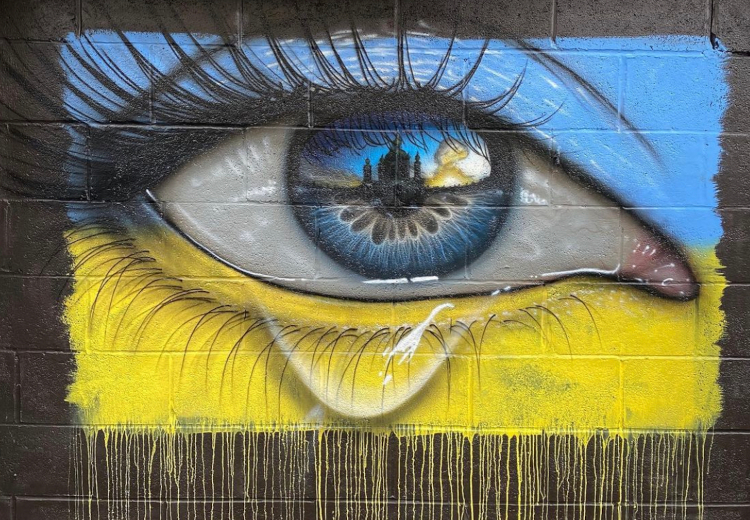Day 7 : Wednesday 1 March
Hear our voice, O Lord, according to your faithful love.
| Jonah 3.1-10 | Psalm 51.6-9 | Luke 11.29-32 |

Ukrainian street artist Sasha Korban painted this mural in Kyiv on the fortieth day of the Russian invasion.
. . . . . . . . . . . . . .
from: Eternal echoes, by John O'Donohue. Perennial, 1999, pp. 111–13.
The Prison of Shame
Shame is one of the most distressing and humiliating emotions. When you feel ashamed, your dignity is torn and compromised. Shame is a powerful emotion; it somehow penetrates to the core of your soul. There is inevitably a strong social dimension to shame. You feel ashamed because you have acted dishonourably in some way. In some cultures, the very danger of incurring shame seemed to keep people from stepping out of line. When someone did, the tribe cohered into one accusing eye glaring at the offender in disgust and judgement. Such a person was inevitably pushed out to the margins of isolation and horrific emotional reprobation. Shame is a force intended to put one outside all belonging. More often than not, such one-sided conformity and its conventions of judgement are factitious and secretly corrupt. The one who does the forbidden thing becomes the focus for all the anger of those who would love to have done it too, but are afraid of the exclusion and shame.
Conventions that can wield the stick of shame are immensely powerful. It is tragic how much women have endured under such conventions.
. . .
We rarely think of the esteem and reputation we enjoy until we are in danger of losing it. This esteem allows us an independent and free space among people. There is no negative intrusion. We can get on with our lives. When you are shamed, the space around you is eviscerated. Now your every move draws negative attention. Hostility and disgust are flung at you. It is impossible from outside even to imagine the humiliation that shame brings. All the natural shelter and support around your presence is taken from you. All the natural imagination with which others have considered the different aspects of your presence stops. Everything about you is telescoped into the single view of this one shameful thing. Everything else is forgotten. A kind of psychological murdering is done. The mystery of your life is reduced to that one thing. You become “a thing of shame.” Shame dehumanizes a person.
. . .
Imagine how shame imprisons those who are on the target list of convention. Imagine the years of silent torment so many gay people have endured, unable to tell their secret. Then, when they declare they are gay, the hostility that rises to assail them. Think of the victims of racism: lovely people who are humiliated and tagged for hostility. The simple fact of their physical presence is sufficient to have a barrage of aggression unleashed on them. The intention of racism is to shame its victims into becoming non-persons.
Beyond its social dimension, shame also has a devastating personal. complexity. When a person is sexually abused or raped, she often feels great shame at what happened to her. The strategy of such violence is to make the victim feel guilty and even responsible for what has happened. Sometimes this personal shame makes the victim silent and passive; consequently, the crime never becomes public. In some instances the threat of social shame further strengthens the decision to stay silent. Part of the essential work in healing such lonely wounding is to help the person to see her Own innocence and goodness and thus unmask the absolutely unwarranted violence of such intrusion and attack. When a person begins to see this, she often begins to awaken the force of anger within her in relation to what has happened to her. The fire of anger can be magnificent in burning off the false garments of shame.
. . . . . . . . . . . . . .
John Rutter (UK, 1945– ). Боже, Україну храни.
Rutter conducts a workshop choir at St Mary Magdalene Church, Wandsworth (March 2022) in his setting of this prayer.
Боже, Україну храни
Дай нам силу, вірі,
й надії Отче наш,
Отче наш. Амінь.
Lord, protect Ukraine.
Give us strength,
faith, and hope,
our Father. Amen.
Rutter writes:
'How can a composer respond to a global tragedy? By writing music is the most obvious thing. Like everybody, I’ve been shocked and dismayed by the events of recent days, and the first thing I wanted to do was write some music that would respond in my own way.
'I went to a late night service in my old college chapel, where they sang a setting of a lovely Ukrainian prayer. So, having encountered the text in another musical setting on Wednesday night, on Thursday, I wrote my own music. I hope the meaning of the text will resonate in people’s hearts.
'I had the opportunity to put it together at very short notice with a wonderful group of 300 people (at a workshop I was leading in Wandsworth, London) which still speaks with my own voice, but in terms that reach out to the Ukrainian people in their hour of need.'
May God our Redeemer show us compassion and love. Amen.